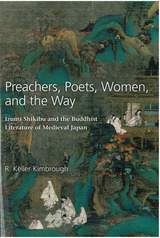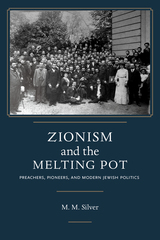2 books about Preachers

Preachers, Poets, Women, and the Way
Izumi Shikibu and the Buddhist Literature of Medieval Japan
R. Keller Kimbrough
University of Michigan Press, 2008
According to a sixteenth-century Japanese commentary on the Lotus Sutra, the venerable Chinsō Kashō was once preaching on the “ten wickednesses of women” when an angry old nun stepped out from the audience and shouted, “It’s not just women who are so evil—you’ve got plenty of wickedness in you, too!” Women were reviled in much of the popular Buddhist rhetoric of medieval Japan, castigated for their “filthy femininity,” but their low spiritual status was in fact frequently contested. This dispute over the place of women in Buddhism was often played out in the realm of medieval preachers’ and storytellers’ apocryphal tales of the lives, deaths, and inevitable religious awakenings of prominent female literary figures of an earlier age. Inspired by the folklorist Yanagita Kunio’s groundbreaking work of the early 1930s, Preachers, Poets, Women, and the Way explores the ways in which such fictional and usually scandalous stories of the Heian women authors Izumi Shikibu, Ono no Komachi, Murasaki Shikibu, and Sei Shōnagon were employed in the competitive preaching and fund-raising of late-Heian and medieval Japan.
The book draws upon a broad range of medieval textual and pictorial sources to describe the diverse and heretofore little-studied roles of itinerant and temple-based preacher-entertainers in the formation and dissemination of medieval literary culture. By plumbing the medieval roots of Heian women poets’ contemporary fame, Preachers, Poets, Women, and the Way illuminates a forgotten world of doctrinal and institutional rivalry, sectarian struggle, and passionately articulated belief, revealing the processes by which Izumi Shikibu and her peers came to be celebrated as the national cultural icons that they are today.
[more]

Zionism and the Melting Pot
Preachers, Pioneers, and Modern Jewish Politics
M. M. Silver
University of Alabama Press, 2020
Traces the roots of ideologies and outlooks that shape Jewish life in Israel and the United States today
Zionism and the Melting Pot pivots away from commonplace accounts of the origins of Jewish politics and focuses on the ongoing activities of actors instrumental in the theological, political, diplomatic, and philanthropic networks that enabled the establishment of new Jewish communities in Palestine and the United States. M. M. Silver’s innovative new study highlights the grassroots nature of these actors and their efforts—preaching, fundraising, emigration campaigns, and mutual aid organizations—and argues that these activities were not fundamentally ideological in nature but instead grew organically from traditional Judaic customs, values, and community mores.
Silver examines events in three key locales—Ottoman Palestine, czarist Russia and the United States—during a period from the early 1870s to a few years before World War I. This era which was defined by the rise of new forms of anti-Semitism and by mass Jewish migration, ended with institutional and artistic expressions of new perspectives on Zionism and American Jewish communal life. Within this timeframe, Silver demonstrates, Jewish ideologies arose somewhat amorphously, without clear agendas; they then evolved as attempts to influence the character, pace, and geographical coordinates of the modernization of East European Jews, particularly in, or from, Russia’s czarist empire.
Unique in his multidisciplinary approach, Silver combines political and diplomatic history, literary analysis, biography, and organizational history. Chapters switch successively from the Zionist context, both in the czarist and Ottoman empires, to the United States’ melting-pot milieu. More than half of the figures discussed are sermonizers, emissaries, pioneers, or writers unknown to most readers. And for well-known figures like Theodor Herzl or Emma Lazarus, Silver’s analysis typically relates to texts and episodes that are not covered in extant scholarship. By uncovering the foundations of Zionism—the Jewish nationalist ideology that became organized formally as a political movement—and of melting-pot theories of Jewish integration in the United States, Zionism and the Melting Pot breaks ample new ground.
Zionism and the Melting Pot pivots away from commonplace accounts of the origins of Jewish politics and focuses on the ongoing activities of actors instrumental in the theological, political, diplomatic, and philanthropic networks that enabled the establishment of new Jewish communities in Palestine and the United States. M. M. Silver’s innovative new study highlights the grassroots nature of these actors and their efforts—preaching, fundraising, emigration campaigns, and mutual aid organizations—and argues that these activities were not fundamentally ideological in nature but instead grew organically from traditional Judaic customs, values, and community mores.
Silver examines events in three key locales—Ottoman Palestine, czarist Russia and the United States—during a period from the early 1870s to a few years before World War I. This era which was defined by the rise of new forms of anti-Semitism and by mass Jewish migration, ended with institutional and artistic expressions of new perspectives on Zionism and American Jewish communal life. Within this timeframe, Silver demonstrates, Jewish ideologies arose somewhat amorphously, without clear agendas; they then evolved as attempts to influence the character, pace, and geographical coordinates of the modernization of East European Jews, particularly in, or from, Russia’s czarist empire.
Unique in his multidisciplinary approach, Silver combines political and diplomatic history, literary analysis, biography, and organizational history. Chapters switch successively from the Zionist context, both in the czarist and Ottoman empires, to the United States’ melting-pot milieu. More than half of the figures discussed are sermonizers, emissaries, pioneers, or writers unknown to most readers. And for well-known figures like Theodor Herzl or Emma Lazarus, Silver’s analysis typically relates to texts and episodes that are not covered in extant scholarship. By uncovering the foundations of Zionism—the Jewish nationalist ideology that became organized formally as a political movement—and of melting-pot theories of Jewish integration in the United States, Zionism and the Melting Pot breaks ample new ground.
[more]
READERS
Browse our collection.
PUBLISHERS
See BiblioVault's publisher services.
STUDENT SERVICES
Files for college accessibility offices.
UChicago Accessibility Resources
home | accessibility | search | about | contact us
BiblioVault ® 2001 - 2024
The University of Chicago Press









